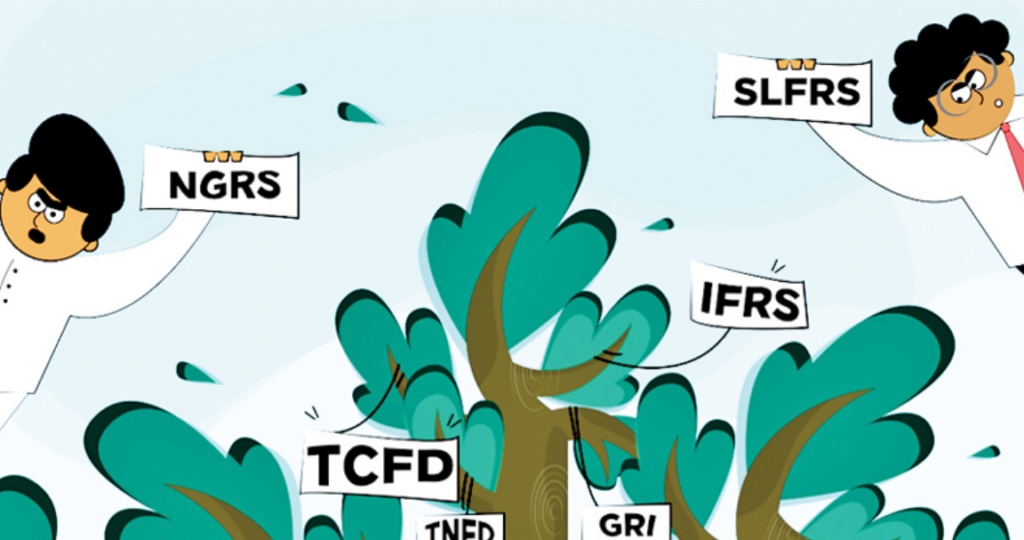
Corporate environmental disclosures are essential for fostering transparency and accountability, allowing businesses to communicate their environmental impacts and risks, while aligning with global climate goals.
In Sri Lanka, the disclosure landscape is rapidly evolving as companies grapple with the dual pressures of meeting international expectations and local requirements.
A recent report by CSF (“Acronyms and Accountability: Strategic Insights on Corporate Environmental Disclosures in Sri Lanka”) delves into the importance of these disclosures for the country’s sustainability journey.
Amid the myriad of international frameworks, two national frameworks shape the Sri Lankan environmental disclosure landscape: the Sri Lanka Financial Reporting Standards (SLFRS) and the National Green Reporting System (NGRS).
The SLFRS sustainability standards were made mandatory for publicly listed companies from this year. However, the NGRS, overseen by the Ministry of Environment (MoE), is a voluntary framework aimed at integrating environmental, social, and governance (ESG) metrics into local business practices, particularly in manufacturing and services sectors.
Based on the triple bottom line approach of profit, people, and planet, the NGRS framework aligns with the Global Reporting Initiative (GRI) G3 Guidelines from 2006.
NGRS in context with global frameworks
Although introduced in 2011, the NGRS has now become dormant. Despite registering over 150 organisations, the framework failed to gain traction, with only a few companies achieving NGRS certification before its implementation stalled in 2020. A glaring issue now is the lack of awareness of the NGRS framework among many corporate stakeholders and prominent sustainability professionals.
The underperformance of the NGRS is largely attributed to its outdated structure. While GRI has undergone numerous changes and updates over the years to address complex emerging challenges, including biodiversity and supply chain emissions, the NGRS remains based on the older and ‘simpler’ version of GRI.
Many companies deemed it redundant, opting instead for internationally recognised frameworks that offered greater credibility in global markets. The primary driver for corporate environmental reporting in Sri Lanka is access to export markets and foreign investments. In this context, a national framework like the NGRS, lacking global recognition, offers limited value to companies aiming to remain competitive internationally. Additionally, from an investor’s perspective, globally accepted frameworks provide greater comparability and consistency across countries and sectors.
The MoE, in collaboration with the United Nations Industrial Development Organisation (UNIDO), has initiated a review of the NGRS with the goal of increasing registrations and NGRS-compliant reporting by 2030.
However, there is limited information on crucial updates to the NGRS, its processes, and its scope. Questions remain about the framework’s ability to adapt to the rapid evolution of global sustainability standards. Updating and maintaining such systems demand significant resources and regulatory effort. Without clear revisions to reflect international standards, or expand beyond manufacturing and services sectors, the framework risks falling further behind global best practices.
In a world moving towards uniform reporting frameworks, the value of maintaining separate national frameworks must be carefully assessed. As Sri Lanka positions itself for economic recovery amidst evolving global sustainability standards, the question arises: can the NGRS be revitalized to bridge the gap between global frameworks and local realities?
Empowering SMEs to overcome data barriers
Sri Lanka’s environmental reporting landscape is fraught with challenges unique to its local context, particularly in data availability and accessibility. Scope 3 emissions reporting stands out as one of the most complex tasks in reporting. Tracking emissions across the value chain demands extensive data collection, data management, and engagement with suppliers and other stakeholders, often involving high costs and resource investments.
In Sri Lanka, small and medium enterprises (SMEs) make up the majority of businesses and form the backbone of most supply chains. Limited resources, lack of expertise, and complexity of reporting frameworks often leave SMEs struggling to meet the growing demands for data collection and sustainability compliance from larger corporations.
Despite these challenges, the inclusion of SMEs in environmental reporting is vital for achieving systemic change in Sri Lanka’s corporate landscape. Supporting these smaller players with an inclusive framework and institutionalised capacity-building programs will ensure they become active participants in environmental reporting practices. Such measures would enable SMEs to collect and contribute valuable data, aligning their operations with the broader sustainability goals of larger supply chains. However, the scale of this effort cannot be underestimated – reaching and equipping all SMEs is a formidable task.
Reinventing the NGRS
The NGRS can be repackaged as an entry point for Sri Lankan businesses to embrace sustainability reporting. While global frameworks dominate sustainability discourses in Sri Lanka, the NGRS has the potential to carve out a niche as a localised solution that balances simplicity with effectiveness.
The NGRS could serve as a tool to support the inclusion of SMEs in Sri Lanka’s reporting landscape by integrating elements from advanced frameworks such as GRI to ensure relevance in the global reporting landscape, but could offer a simpler and more accessible approach for smaller organisations.
This would enable these SMEs to communicate effectively with stakeholders and collect essential data without the complexities of global frameworks. A foundational framework like this could drive progress even for larger organisations in streamlining basic data collection processes.
However, to fully integrate SMEs into sustainability reporting, frameworks alone are insufficient. SMEs require robust support systems, including targeted training, capacity building, and technical guidance. The MoE could play a pivotal role by offering subsidised training programs and creating easily accessible toolkits for smaller organisations. In this capacity, the reach and resources of the MoE can become a critical enabler, bridging the gap between SMEs and global sustainability frameworks.
The path forward for the NGRS lies in its reinvention as a dynamic and inclusive framework that aligns with both global standards and local needs. However, its success will hinge on collective action of policymakers, corporate leaders and sustainability professionals. With the right support and strategic interventions, the NGRS can evolve from a dormant initiative into a cornerstone of Sri Lanka’s environmental reporting landscape, empowering businesses of all sizes to contribute to a sustainable and resilient future.
Article Credit: sundayobserver